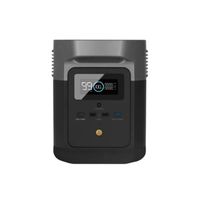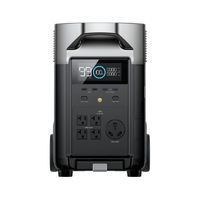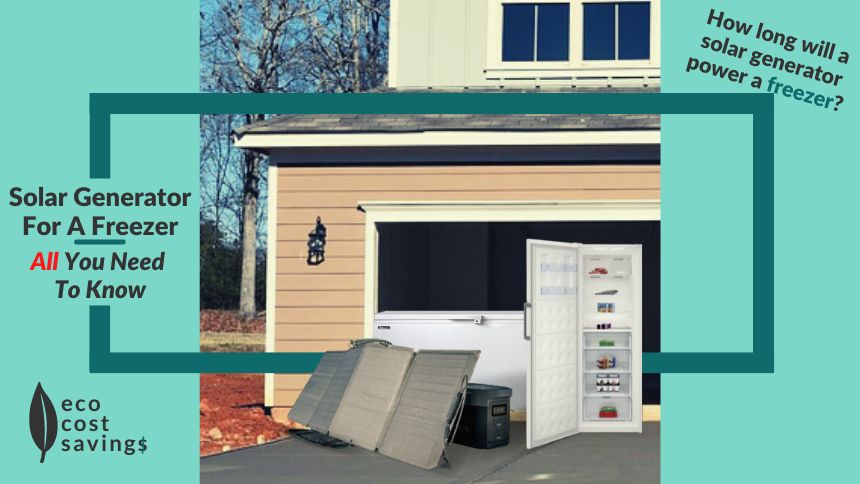Last updated: February 15, 2024.
Will a solar generator power a freezer? Get key solar generator considerations (incl. 4 steps to appropriate sizing) that’ll help you take your freezer off-grid or simply keep it running during a blackout.
Solar generators can power freezers, but not all will.
In addition to being a safety hazard, incorrect sizing can damage both the freezer and the solar generator itself.
In this article you’ll see how you can correctly identify the appropriate solar generator for your freezer.
Additionally, you’ll get freezer power consumption insights, key solar generator considerations, and much more.
To deliver more helpful insights, and to avoid “it depends”, two market leading solar generators have been identified, and their specs will be used as examples.
The two market leading solar generators that are capable of powering a freezer have been selected based on power output, battery lifespan / cycles, reliability, versatility, ease of use, and price.
These two freezer solar generators suit different use cases, and budgets.
One is more suited to those that want just enough power to run their freezer for a short period of time (e.g. during a power outage).
The other suits those that want to power their freezer indefinitely, reduce their reliance on the grid and / or those starting their journey into power independence.
The table below gives a quick snapshot of the key takeaways from this article, and (in order to get more specific than “it depends”) uses the two market leading solar generator options for the two different use cases.
| Freezer backup use case | Freezer backup + off-grid | |
| Solar generator | EcoFlow Delta Mini | EcoFlow Delta Pro |
| Appearance |  |  |
| Backup duration (battery only) | ~21 hrs (max) | ~3.5 days |
| Backup duration (with solar, and assuming 4 hrs of peak sunlight p/d) | 3 days (potentially) | Essentially unlimited |
| Note | Meets the power requirements for most modern freezers. Cost effective, reputable, and versatile option | More than enough for multiple freezers. This is a great future-proofed first step into reducing your reliance on the grid |
| Price category | Budget (see price with solar panels, here, & without a solar panel, here) | Premium (check out the price with a solar panel, here, & without a solar panel, here) |
Backup duration estimates are based on the average amount of electricity that a modern freezer consumes per day (more on this below), assume the solar generator is completely charged and will run until it’s completely empty, or until it doesn’t get sufficient solar power to run the freezer. Also, it’s assumed that there is no loss in efficiency (more on this below too).

Can a solar generator power a freezer? Key considerations
Yes, a solar generator can power a freezer.
The solar generator must, however, be appropriately sized for the freezer.
To power a freezer, a solar generator must have a sufficiently large battery capacity, and cater to the power surges that are drawn by freezers.
Solar input capacity, and battery charge cycles are additional key considerations.
Solar input capacity refers to how much and how quickly the generator can recharge via solar panels. The quicker the better, but also the higher the expense (usually).
Battery charge cycles refers to the estimated amount of times the solar generator can be recharged during its lifetime.
This is particularly important if you intend to run a freezer off-grid. If you intend to use the solar generator during blackouts only, then the battery charge cycles figure is less important.
This is because you won’t need to recharge the battery as often. (How many blackouts have you had this year? A few, several, or less?)
In this case, to not worry about charge cycles, consider a solar generator that offers uninterrupted power supply functionality where the unit only powers the freezer from the battery when the power goes out.
However, if you intend to run a freezer completely off-grid, then the number of charge cycles is an important consideration, and is generally worth the higher investment.
Certain battery technologies (e.g. LiFePO4) offer more charge cycles than others. Manufacturers list their expected charge cycles in each unit’s spec sheets.
To get the longest lifespan from any solar generator, make sure you don’t run it at its max load continuously.
When choosing a new solar generator, consider going for a unit that is rated for double the required load.
So, what size solar generator can run a freezer?
What size solar generator do I need to run a freezer?
A 620W solar generator, that delivers 930W of surge power, will run a modern freezer. A solar panel that generates 310W will typically keep a modern freezer running by itself (if it’s connected to a battery that caters to the power surge demands).
This is based on a comprehensive freezer power consumption study (updated for 2024), which found that modern freezer wattage ranges from 80W to 310W.
The figures above are based on the highest wattage result, i.e. 310W.
A solar generator that delivers 620 watts, continuously, is appropriate because the load would be 50% (max) of the continuous expected draw, which helps extend the life of the battery.
Also the peak draw of 930 watts caters to freezer power surges, which are expected to be 2-3 times the freezer power rating.
In terms of solar panels, an array that delivers 310W (after inefficiencies) per hour will be sufficient to keep a high wattage modern freezer running for that hour.
More panels would be required to add sufficient charge to the solar generator to keep the freezer running overnight.
Continue reading to see how much charge is required to power a freezer for a full day.
But this is for modern, more efficient freezers.
To run older, more power hungry freezers, the size of the solar generator will need to be larger.
To keep the power draw at around 50%, the solar generator would need to deliver ~1800W continuously, and cater to surges of ~2700W.
To be on the safe side, the above solar generator sizes assume freezers run at their max wattage continuously.
But this isn’t the case.
Freezers draw different amounts of watts during different cooling stages (e.g. active cooling, idle). Get more details about freezer power consumption, here.
But what about your own specific freezer? What size solar generator would suit you? Let’s take a look at how you can work this out.
How to size a solar generator for your freezer in 4 steps
In order to work out the size of solar generator you need to run your freezer, follow these 4 steps:
- Identify your freezer’s wattage, and peak draw during surges. The wattage is usually listed on the appliance, and in the owner’s manual. You may need to contact the manufacturer to find the power surge requirements. Many assume freezer power surges will be 2 to 3 times the wattage, but it’s best to be on the safe side and confirm this with the manufacturer (or use a multimeter);
- Double the wattage to get your freezer’s continuous wattage requirement. It’s worth noting that this will be on the high-side. As mentioned above, freezer’s don’t draw their max wattage continuously. And doubling the wattage is intended to help extend the battery life of the solar generator;
- Identify the required battery capacity. How long do you want to keep your freezer running while the power is out (e.g. 4 hours, 1 day), and how much power does your freezer consume? Check your freezer’s energy label (or find it online) to see the estimated amount of electricity it uses per year. Then divide by 365 to get a daily estimate. A modern freezer consumes 1kWh of electricity per day, on average. So, to keep an average modern freezer running for a day without solar, you’d need a solar generator with at least 1kWh of battery capacity. Tip: to extend battery life, don’t completely drain the battery – consider adding 10%-20% to the desired battery capacity; and
- Do you need solar panels? If so, estimate your solar array requirements. Using battery storage alone can help keep solar generator purchasing costs down. However, if you intend to keep your freezer running for longer periods of time, solar panels will be required to top up the battery. You need to choose how long you want to run your freezer without power, and then use the daily power consumption figure from the previous steps. Let’s say you want to run your freezer indefinitely, and it consumes 1kWh of electricity per day. You need enough solar panels, and solar input capacity, to add 1kWh of charge to your solar generator during daylight hours. This would mean, for example, connecting a 300W solar panel to a solar generator that has solar capacity of at least 300W. And placing the panel in a location that gets more than 3 hours of sun per day (excluding inefficiencies).
So, now that we know how to choose the right size solar generator for a freezer, let’s take a look at the 2 market leading options to see how they perform when powering a freezer.
Solar generator for freezer
Once you know your solar generator requirements, based on your needs and your freezer’s power demands, here are some additional key considerations:
- Your use case (e.g. temporary backup power for a freezer, complete off-grid use);
- Output (to run a standard home freezer the solar generator must deliver the appropriate output, via a standard outlet, e.g. 110V, AC);
- Battery cycles (as mentioned above, this is less important for the temporary backup power use case where there is pass-through power functionality);
- Quality & reliability (lower quality, less reliable solar generators are becoming increasingly common – consider choosing models from more established reputable manufacturers);
- Versatility (you may have future requirements that a solar generator can help with, e.g. charging devices while on camping trips, commencing your off-grid journey);
- Ease of use (DIY solar generation systems can get complex, and be time consuming to set up); and
- Price (of course).
Based on these considerations, along with the comprehensive freezer power consumption study, and extensive research into solar generators, here are two market leading solutions for freezers:
| Solar generator for freezers | EcoFlow Delta Mini solar generator | EcoFlow Delta Pro solar generator |
 |  | |
| Best suited for: | Temporary freezer backup power | Temporary, & longer-term freezer backup, plus complete off-grid living |
| Backup duration (battery only*) | ~21 hrs (max) | ~3.5 days |
| Backup duration (with solar panels**) | 3 days (potentially) | Essentially unlimited |
| Battery capacity | 882Wh / 0.882 kWh | 3,600Wh / 3.6 kWh |
| Watts (continuous) | 1,400W | 3,600W |
| Peak watts (surge) | 2,100W | 7,200W |
| Charging options | Solar, wall outlet and car outlet | Solar, wall outlet, car outlet, and even EV charging stations |
| Solar charging input | 300W, 10A, 11-75V (max) | 1,600W, 15A, 11-150V (max) |
| Price category | Budget (see price with solar panels, here, & without solar panels, here) | Premium (check out the price with a solar panel, here, & without a solar panel, here) |
| Note | Meets the power requirements for most modern freezers. Cost effective, reputable, and versatile option | More than enough for multiple freezers, and appliances. This is a great future-proofed first step into reducing your reliance on the grid |
*Estimates are based on the average amount of electricity that a modern freezer consumes per day (i.e. 1.008 kWh), assumes the solar generator is completely charged and will run until it’s completely empty, and there has been no loss in efficiency.
**Estimates assume 4 hours of sunlight per day, while trying to reach the unit’s maximum solar charging input potential but achieving 60% due to common weather conditions. And an initial full charge.
To ensure safe operation of your appliance be sure to check with the manufacturer of your freezer and solar generator.
Final thoughts
Whether or not you’re seeking temporary backup power for your freezer, taking it completely off-grid, or simply trying to reduce your carbon footprint and electricity bills, solar generators are a great solution.
And to highlight again, freezers require a constant supply of electricity to keep its contents cold. But the power demand from this constant supply fluctuates considerably.
From a low power draw while idle, to power surges when entering active cooling mode, solar generators must cater to the fluctuating power demands of freezers.
I hope that the details above, including the market leading solutions, helps you power your freezer from a solar generator safely and effectively.
If you’re looking to limit your overall power demand quickly and easily, don’t miss this cost-free 6 Quick Wins Cheat Sheet:
-
Freezer Wattage Results [Most Efficient Revealed 2024]
How many watts does a freezer use? Find out here, by type & brand, based on 354 models. Get a shortlist of energy efficient freezers & see which freezer is the most efficient on the market.
-
Cost To Run A Freezer [Based On 354 Models | $$ Saving Tips]
How much does it cost to run a freezer? Find out here, by freezer type, based on 354 models. And get 10 tips to keep your freezer running costs and carbon footprint low.
-
How Many Amps Does A Freezer Use? [Surge, Running & Low Amp Freezers]
From chest to upright to compact freezers, see how many amps freezers use below, including their startup draw. Plus, see standout low amp freezers, breaker sizes, and which freezer type has the lowest amp draw.
James F (not to be confused with ECS co-founder James) is our lead author, content & website manager. He has a BSc. in Digital Marketing, and a Diploma in IT. He became a qualified electrician while studying electrical engineering part-time.
From wind and solar photovoltaic installers, James F worked with many certified energy practitioners and energy consultants before joining the core ECS team. He also helped build the most downloaded energy saving app while working with a leading utility company.
Read more about James F or connect directly on LinkedIn, here.


![Freezer Wattage Results [Most Efficient Revealed 2024]](https://ecocostsavings.com/wp-content/uploads/2022/02/freezer-wattage.jpg)
![Cost To Run A Freezer [Based On 354 Models | $$ Saving Tips]](https://ecocostsavings.com/wp-content/uploads/2022/02/cost-to-run-a-freezer.jpg)
![How Many Amps Does A Freezer Use? [Surge, Running & Low Amp Freezers]](https://ecocostsavings.com/wp-content/uploads/2022/02/how-many-amps-does-a-freezer-use.jpg)